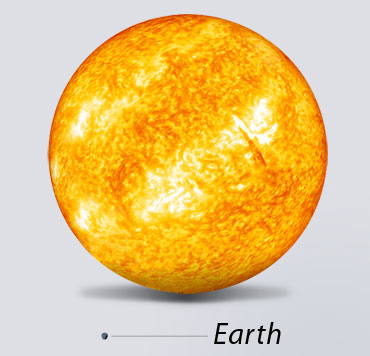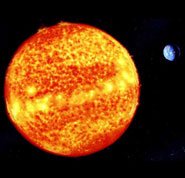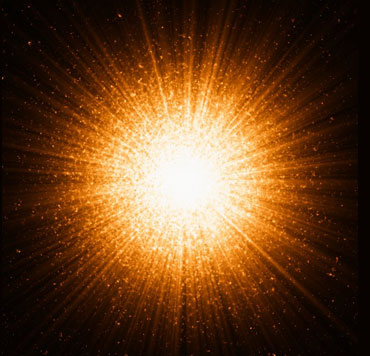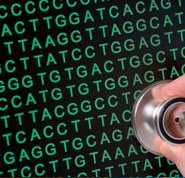
By Marilyn Adamson
Just once wouldn't you love for someone to simply show you the evidence for God's existence? No arm-twisting. No statements of, "You just have to believe." Well, here is an attempt to candidly offer some of the reasons which suggest that God exists.
But first consider this. When it comes to the possibility of God's existence, the Bible says that there are people who have seen sufficient evidence, but they have suppressed the truth about God.1 On the other hand, for those who want to know God if he is there, he says, "when you seek me with all your heart, I will be found by you."2
Before you look at the facts surrounding his existence, ask yourself, If God does exist, would I want to know him? Here then are some reasons to consider.
Many examples showing God's design could be given, possibly with no end. But here are a few:
 The Earth…its size is perfect. The Earth's size and corresponding gravity hold a thin layer of mostly nitrogen and oxygen gases, only extending about 50 miles above the Earth's surface. If Earth were smaller, an atmosphere would be impossible, like the planet Mercury. If Earth were larger, its atmosphere would contain free hydrogen, like Jupiter.3 Earth is the only known planet equipped with an atmosphere of the right mixture of gases to sustain plant, animal and human life.
The Earth…its size is perfect. The Earth's size and corresponding gravity hold a thin layer of mostly nitrogen and oxygen gases, only extending about 50 miles above the Earth's surface. If Earth were smaller, an atmosphere would be impossible, like the planet Mercury. If Earth were larger, its atmosphere would contain free hydrogen, like Jupiter.3 Earth is the only known planet equipped with an atmosphere of the right mixture of gases to sustain plant, animal and human life.
The Earth is located the right distance from the Sun.
 Consider the temperature swings we encounter, roughly -30 degrees to +120 degrees. If the Earth were any further away from the sun, we would all freeze. Any closer and we would burn up. Even a fractional variance in the Earth's position to the sun would make life on Earth impossible.
Consider the temperature swings we encounter, roughly -30 degrees to +120 degrees. If the Earth were any further away from the sun, we would all freeze. Any closer and we would burn up. Even a fractional variance in the Earth's position to the sun would make life on Earth impossible.
The Earth remains this perfect distance from the sun while it rotates around the sun at a speed of nearly 67,000 mph. It is also rotating on its axis, allowing the entire surface of the Earth to be properly warmed and cooled every day.
And our Moon is the perfect size and distance from the Earth for its gravitational pull. The Moon creates important ocean tides and movement so ocean waters do not stagnate, and yet our massive oceans are restrained from spilling over across the continents.4
Water…colorless, odorless and without taste, and yet no living thing can survive without it. Plants, animals and human beings consist mostly of water (about two-thirds of the human body is water). You'll see why the characteristics of water are uniquely suited to life:
 Water is a universal solvent allowing various chemicals, minerals and nutrients to easily dissolve and be carried throughout our bodies and into the smallest blood vessels.5
Water is a universal solvent allowing various chemicals, minerals and nutrients to easily dissolve and be carried throughout our bodies and into the smallest blood vessels.5
Water is also chemically neutral. Without affecting the makeup of the substances it carries, water enables food, medicines and minerals to be absorbed and used by the body.
Water has a unique surface tension. Water in plants can therefore flow upward against gravity, bringing life-giving water and nutrients to the top of even the tallest trees.
Water freezes from the top down and floats, so fish can live in the winter.
 Ninety-seven percent of the Earth's water is in the oceans. But on our Earth, there is a system which removes salt from the water and then distributes that water throughout the globe. Evaporation takes the ocean waters, leaving the salt, and forms clouds which are easily moved by the wind to disperse water over the land, for vegetation, animals and people. It is a system of purification and supply that sustains life on this planet, a system of recycled and reused water.6
Ninety-seven percent of the Earth's water is in the oceans. But on our Earth, there is a system which removes salt from the water and then distributes that water throughout the globe. Evaporation takes the ocean waters, leaving the salt, and forms clouds which are easily moved by the wind to disperse water over the land, for vegetation, animals and people. It is a system of purification and supply that sustains life on this planet, a system of recycled and reused water.6
When you see a building, you know that people constructed it. It didn’t just appear. And it didn’t always exist.
Science has determined that the universe had a start. How do we find out what caused it?
Scientists are convinced that our universe began with one enormous explosion of matter, energy and light, which we now call the Big Bang. It was the singular start to everything that exists in our universe.
 Steven Weinberg, a Nobel laureate in Physics, said at the moment of this explosion, "the universe was about a hundred thousand million degrees Centigrade … and the universe was filled with light."7
Steven Weinberg, a Nobel laureate in Physics, said at the moment of this explosion, "the universe was about a hundred thousand million degrees Centigrade … and the universe was filled with light."7
This eerily parallels the record, "In the beginning, God created the heavens and the earth … and God said, 'Let there be light,' and there was light."8 It came about not from matter, but from pronouncement. A spoken word. "Let there be light."
Astrophysicist Robert Jastrow, a self-described agnostic, stated, "For the scientist who has lived by his faith in the power of reason, the story ends like a bad dream. He has scaled the mountains of ignorance; he is about to conquer the highest peak; as he pulls himself over the final rock, he is greeted by a band of theologians who have been sitting there for centuries."9
The singular start of the universe, this massive explosion of light, parallels God's own account in the Bible, written thousands of years before scientists discovered the Big Bang.
Much of life may seem uncertain, but look at what we can count on day after day. Gravity remains consistent. A hot cup of coffee left on a counter will always cool. The earth consistently rotates in exactly 24 hours. And the speed of light doesn't change — on earth or in galaxies far from us.
All of the sciences — molecular biology, chemistry, physics, astronomy, etc. — hinge on the consistent laws of nature.
Dr. Emily Baldwin commented, "One of the most important numbers in physics, the proton-electron mass ratio, is the same in a galaxy six billion light years away as it is here on Earth…"10
 How is it that we can identify laws of nature that never change? Why is the universe so orderly, so reliable?
How is it that we can identify laws of nature that never change? Why is the universe so orderly, so reliable?
"The greatest scientists have been struck by how strange this is. There is no logical necessity for a universe that obeys rules, let alone one that abides by the rules of mathematics. This astonishment springs from the recognition that the universe doesn't have to behave this way. It is easy to imagine a universe in which conditions change unpredictably from instant to instant, or even a universe in which things pop in and out of existence."11
Physicist Paul C. Davies comments: "…to be a scientist, you had to have faith that the universe is governed by dependable, immutable, absolute, universal, mathematical laws…”12
All of our ability to discover, solve problems, create is made possible by the orderly laws of the universe that never change and can be measured with precision.
Richard Feynman, a Nobel Prize winner for quantum electrodynamics, said, "Why nature is mathematical is a mystery…The fact that there are rules at all is a kind of miracle."13
In each cell of your body, DNA exists as a very detailed instruction code, functioning much like a miniature computer program.
 Computer programs are made up of ones and zeros, like this: 110010101011000. The way they are arranged tells the computer program what to do.
Computer programs are made up of ones and zeros, like this: 110010101011000. The way they are arranged tells the computer program what to do.
The DNA code in each of our cells is very similar. It's made up of four chemical units, arranged in the human cell like this: CGTGTGACTCGCTCCTGAT and so on. There are three billion pairs of these letters in every human cell.14
 How DNA is arranged in your cells tells your body how to function. It is a full instruction manual.15
How DNA is arranged in your cells tells your body how to function. It is a full instruction manual.15
Natural, biological causes are completely lacking as an explanation when programmed information is involved. You cannot find instruction, precise information like this, without a programmer.
Our brains are further evidence of precise planning.
Your brain simultaneously processes a vast amount of information. It takes in all the colors and objects you see, the temperature around you, the pressure of your feet against the floor, the sounds around you, the dryness of your mouth, and the texture of an object in your hand.
 At the same time, it registers all your emotions, thoughts, and memories. Still at the same time, it keeps track of the ongoing functions of your body like your breathing pattern, eyelid movement, heartbeat, movement of each muscle, hunger.
At the same time, it registers all your emotions, thoughts, and memories. Still at the same time, it keeps track of the ongoing functions of your body like your breathing pattern, eyelid movement, heartbeat, movement of each muscle, hunger.
The human brain processes more than a million messages a second.16 It weighs the importance of all this data, filtering out the relatively unimportant so you can focus and operate effectively in your world.
Your brain functions differently than your other organs. There is an intelligence to it, the ability to reason, to produce feelings, to dream and plan, to take action, and relate to other people.
Beyond your brain, we could talk about the functions of the heart, your respiratory system, how your eye can distinguish among seven million colors, and much more.
It’s hard to look in detail at the human body and conclude that it all simply fell into place nicely. Would we look at a nonliving car and decide that no planning was behind it? Why would we conclude no such planning went into a far more complex living entity as yourself?
I was an atheist at one time. And like many atheists, the issue of people believing in God bothered me greatly. What is it about atheists that we would spend so much time, attention, and energy refuting something that we don't believe even exists?! What causes us to do that?
When I was an atheist, I attributed my intentions as caring for those poor, delusional people…to help them realize their hope was completely ill-founded. To be honest, I also had another motive. As I challenged those who believed in God, I was deeply curious to see if they could convince me otherwise. Part of my quest was to become free from the question of God. If I could conclusively prove to believers that they were wrong, then the issue is off the table, and I would be free to go about my life.
 I didn't realize that the reason the topic of God weighed so heavily on my mind, was because God was pressing the issue. I have come to find out that God wants to be known. He created us with the intention that we would know him. He has surrounded us with evidence of himself and he keeps the question of his existence squarely before us.
I didn't realize that the reason the topic of God weighed so heavily on my mind, was because God was pressing the issue. I have come to find out that God wants to be known. He created us with the intention that we would know him. He has surrounded us with evidence of himself and he keeps the question of his existence squarely before us.
It was as if I couldn't escape thinking about the possibility of God. In fact, the day I chose to acknowledge God's existence, my prayer began with, "Ok, you win…" It might be that the underlying reason atheists are bothered by people believing in God is because God is actively pursuing them.
I am not the only one who has experienced this. Malcolm Muggeridge, socialist and philosophical author, wrote, "I had a notion that somehow, besides questing, I was being pursued." C.S. Lewis said he remembered, "…night after night, feeling whenever my mind lifted even for a second from my work, the steady, unrelenting approach of Him whom I so earnestly desired not to meet. I gave in, and admitted that God was God, and knelt and prayed: perhaps, that night, the most dejected and reluctant convert in all of England."
Lewis went on to write a book titled, "Surprised by Joy" as a result of knowing God. I too had no expectations other than rightfully admitting God's existence. Yet over the following several months, I became amazed by his love for me.
Jesus Christ (God in human form) shows us God’s compassion, truth and power.
Why Jesus? Look throughout the major world religions and you'll find that Buddha, Muhammad, Confucius and Moses all identified themselves as teachers or prophets. None of them ever claimed to be equal to God. Surprisingly, Jesus did. That is what sets Jesus apart from all the others. He said God exists and you're looking at him.
Though he talked about his Father in heaven, it was not from the position of separation, but of very close union, unique to all humankind. Jesus said that anyone who had seen Him had seen the Father, anyone who believed in him, believed in the Father.
 He said, "I am the light of the world, he who follows me will not walk in darkness, but will have the light of life."17 He claimed attributes belonging only to God: to be able to forgive people of their sin, free them from habits of sin, give people a more abundant life and give them eternal life in heaven.
He said, "I am the light of the world, he who follows me will not walk in darkness, but will have the light of life."17 He claimed attributes belonging only to God: to be able to forgive people of their sin, free them from habits of sin, give people a more abundant life and give them eternal life in heaven.
Unlike other teachers who focused people on their words, Jesus pointed people to himself. He did not say, "follow my words and you will find truth." He said, "I am the way, the truth, and the life, no one comes to the Father but through me."18
What proof did Jesus give for claiming to be divine? He did what people can't do. Jesus performed miracles. He healed people…blind, crippled, deaf, even raised a couple of people from the dead. He had power over objects…created food out of thin air, enough to feed crowds of several thousand people.
He performed miracles over nature…walked on top of a lake, commanding a raging storm to stop for some friends. People everywhere followed Jesus, because he constantly met their needs, doing the miraculous. He said if you do not want to believe what I'm telling you, you should at least believe in me based on the miracles you're seeing.19
Jesus Christ showed God to be gentle, loving, aware of our self-centeredness and shortcomings, yet deeply wanting a relationship with us. Jesus revealed that although he views us as sinners, worthy of his punishment, his love for us ruled and he came up with a different plan.
God himself took on the form of man and accepted the punishment for our sin on our behalf. Sound ludicrous? Perhaps, but many loving fathers would gladly trade places with their child in a cancer ward if they could. The Bible says that the reason we would love God is because he first loved us.
Jesus died in our place so we could be forgiven. Of all the religions known to humanity, only through Jesus will you see God reaching toward humanity, providing a way for us to have a relationship with him. Jesus proves a divine heart of love, meeting our needs, drawing us to himself.
Because of Jesus' death and resurrection, he offers us a new life today. We can be forgiven, fully accepted by God and genuinely loved by God. He says, "I have loved you with an everlasting love, therefore I have continued my faithfulness to you."20 This is God, in action.
 Does God exist? If you want to know, investigate Jesus Christ. We're told that "God so loved the world that he gave his only Son, that whoever believes in him should not perish but have eternal life."21
Does God exist? If you want to know, investigate Jesus Christ. We're told that "God so loved the world that he gave his only Son, that whoever believes in him should not perish but have eternal life."21
God does not force us to believe in him, though he could. Instead, he has provided sufficient proof of his existence for us to willingly respond to him. The earth's perfect distance from the sun, the unique properties of water, the human brain, DNA, the number of people who attest to knowing God, the gnawing in our hearts and minds to determine if God is there, the willingness for God to be known through Jesus Christ. If you need to know more about Jesus and reasons to believe in him, please see: Why Jesus is God.
This is your decision, no coercion here. But if you want to be forgiven by God and come into a relationship with him, you can do so right now by asking him to forgive you and come into your life. Jesus said, "Behold, I stand at the door [of your heart] and knock. He who hears my voice and opens the door, I will come into him [or her]."22
If you want to do this, but aren't sure how to put it into words, this may help: "Jesus, thank you for dying for my sins. You know my life and that I need to be forgiven. I ask you to forgive me right now and come into my life. I want to know you in a real way. Come into my life now. Thank you that you wanted a relationship with me. Amen."
God views your relationship with him as permanent. Referring to all those who believe in him, Jesus Christ said of us, "I know them, and they follow me; and I give them eternal life, and they shall never perish, and no one shall snatch them out of my hand."23
Looking at all these facts, one can conclude that a loving God does exist and can be known in an intimate, personal way.
| ► | I just asked Jesus into my life (some helpful information follows)... |
| ► | I may want to ask Jesus into my life, please explain this more fully... |
| ► | I have a question or comment... |
Footnotes: (1) Romans 1:19-21 (2) Jeremiah 29:13-14 (3) R.E.D. Clark, Creation (London: Tyndale Press, 1946), p. 20 (4) The Wonders of God's Creation, Moody Institute of Science (Chicago, IL) (5) Ibid. (6) Ibid. (7) Steven Weinberg; The First Three Minutes: A Modern View of the Origin of the Universe; (Basic Books,1988); p 5. (8) Genesis 1:1-3 (9) Robert Jastrow; God and the Astronomers; (Readers Library, Inc.; 1992) (10) Dr. Emily Baldwin; "Earth's Laws Still Apply in Distant Universe"; AstronomyNow.com; June, 2008. (11) Dinesh D'Souza, What's So Great about Christianity; (Regnery Publishing, Inc, 2007, chapter 11). (12) Paul C. Davies, physicist, cosmologist, astrobiologist, at Arizona State University; quoted in edge.org/conversation/taking-science-on-faith (13) Richard Feynman, The Meaning of It All: Thoughts of a Citizen-Scientist (New York: BasicBooks, 1998), 43. (14) https://www.genome.gov/human-genome-project/Completion-FAQ (15) Francis S. Collins, director of the Human Genome Project, and author of The Language of God, (Free Press, New York, NY), 2006 (16) The Wonders of God's Creation (17) John 8:12 (18) John 14:6 (19) John 14:11 (20) Jeremiah 31:3 (21) John 3:16 (22) Revelation 3:20 (23) John 10:27-29
Other articles/videos you might be interested in…